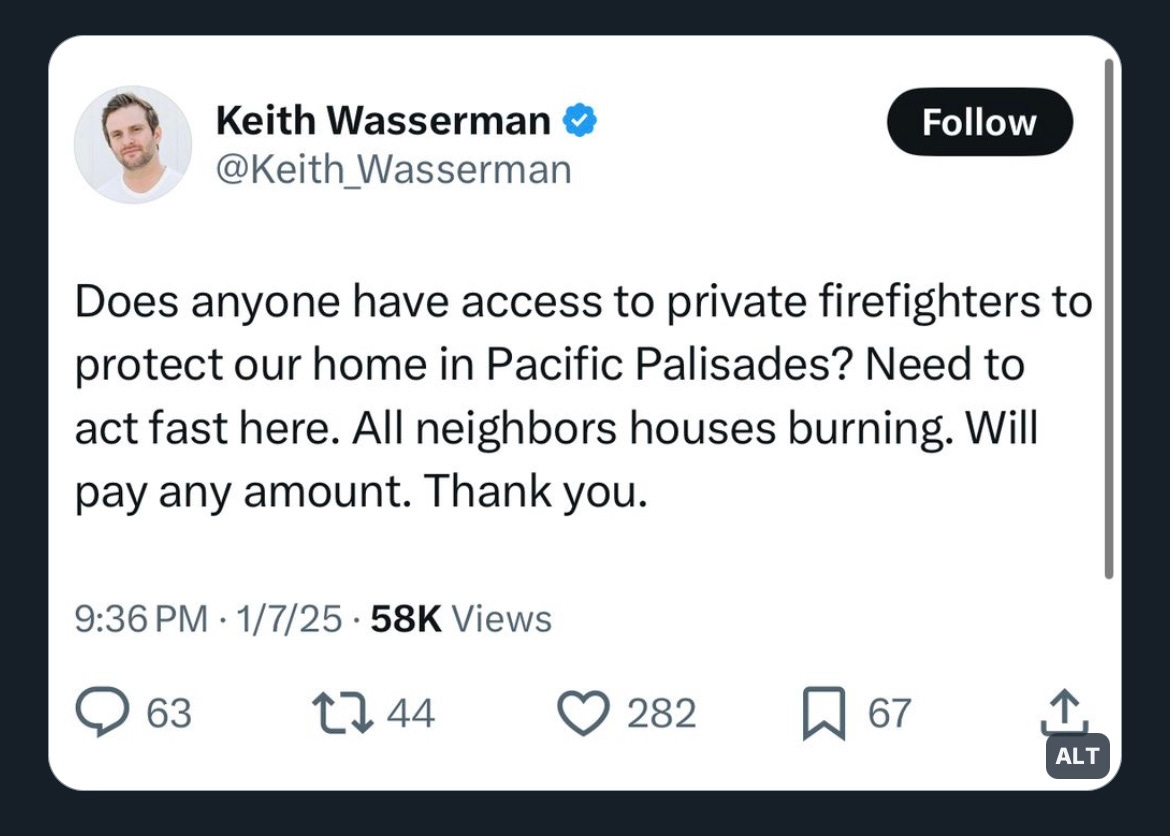The illusion of money as safety during the climate crisis
Can you buy your way out of the climate crisis?
This edition brought to you by employment law firm White & Hilferty.
Last week, I posted a TikTok about the fire in Los Angeles (please see here, here, and here to donate in various ways—it goes without saying that it’s just horrific and surreal). I find firefighters, including the incarcerated people getting paid only $10 a day, to comprise some of the most “masculine energy” out there.
(In case you missed it, Zuckerberg thinks corporate America needs more masculinity.)
The TikTok cited a now-deleted post on X from Keith Wasserman, a tech entrepreneur who wrote in his post that he would “pay any amount” for private firefighters to save his home in the Palisades. “Need to act fast,” he wrote.
At that point, so many wealthy and famous people’s homes had tragically burned down, or were in the process of burning down. Even those that remained were confronted with charred neighborhoods, fleeing animals, burnt schools, and toxic air quality.
After I saw Wasserman’s post, I wondered—given the density and the number of wealthy people in some of the areas impacted (this wasn’t just a few mansions or compounds in a rural area like Idaho)—were there enough private fire squads to service each one of them?
How many private firefighters would be needed? Are there enough trained? Will the billionaires poach skilled private firefighters from the millionaires? (Never mind that there wasn’t enough water—but hypothetically, if there was—could money actually solve this for them?)
The post blew up. Nearly 400,000 views later, some people half-jokingly offered to fly to LA to learn how to become a firefighter for a million dollars, others questioned why I cared in the first place, a few mentioned sarcastically that the wealthy should throw their physical cash at the fire, and a bunch said that they would do the same as Wasserman if they had the money to put out a call for a squad.
Some actual firefighters responded to explain that private firefighter squads are very much a thing. Later reporting has revealed that firefighters can be paid $2,000 an hour to provide services to the ultra-wealthy—and that private firefighters are now in demand in LA.
In general, the commenters on the TikTok landed in one of two camps: that money could buy whatever, including insulation from climate disaster—or that this was inescapable for everyone. That this was a real-life unfurling of the film Don’t Look Up, where the super-rich do escape earth on their rockets, but meet a bleak fate up in space when they get there. (Or, the actual history of the Titanic, where the first-class passengers who stayed behind met the same fate of third-class passengers and crew.)
In other words, no one is totally immune from mother nature or the cosmos. Money is, after all, a social construct. And although some tech billionaires believe we live in a predictable simulation where we (or they) can prepare, the lack of planning here in dozens of ways (blamed inaccurately and politically on “DEI” and lesbian leadership of the LAFD) would have us believe otherwise.
The people who commented that the wealthy can theoretically build their bunkers and save themselves are not wrong—in some ways. The documentary The Grab is an incredible and haunting look into the efforts of a network of governments and super-rich private firms to buy up aquifers in the southwest US, and arable land in Africa—of course, uprooting native people to buy up territory. Further, it shows a sinister plan to invest in private militias to guard that land. So it’s not a far-fetched conspiracy that they could and will hoard resources.
But while all of this is disturbing and doesn’t do much to ease insomnia, my feeling is that these sorts of plots never go according to plan. There are too many competing wealthy interests—Zuckerberg with his band of UFC and MMA fighters, Musk and Bezos with their competing penis rockets. They will cannibalize each other. Meanwhile, true communities realize that climate resilience cannot be solved by one call for a private squad to “act fast.”
This LinkedIn post by former Google CEO Eric Schmidt’s daughter, Sophie Schmidt, shows how local journalism and volunteers providing updates from emergency fire radio updates did more for us realistically than whatever AI for X has been pitched and funded in some venture capital meeting without proof of success. Smart, not “smart.”
In any case, one of the most top-liked comment on my TikTok was the following:
And a cartoon created a few years ago, for your viewing pleasure:
Some other things I’m reading…
The Anti-Social Century, by Derek Thompson of The Atlantic: Americans are now spending more time alone than ever. It’s changing our personalities, our politics, and even our relationship to reality.
Joe Zaczyk: That Night, by Mandy Lehman: What happened the night a woman believes she was date-raped from a match off of Bumble.
You trimmed my toenails and poured cereal in my hair, by Marjorie Perry: A writer details the confusion of having pleasant memories from an abusive marriage.
There Is No Safe Word, by Lila Shapiro of New York Magazine: How the best-selling fantasy author Neil Gaiman hid the darkest parts of himself for decades.
The Surprise Winner of the TikTok Ban, by Alex Kirshner of Slate: A simple work-around might undermine America’s biggest move against the app.
Thank you everyone for reading! More to come, send ideas if you want me to write about anything.
~Ari






